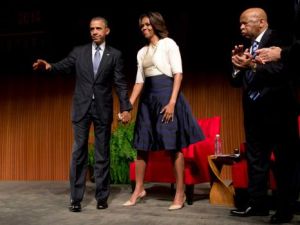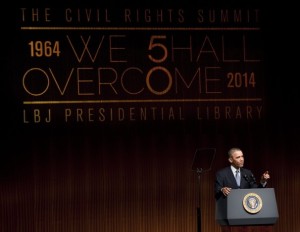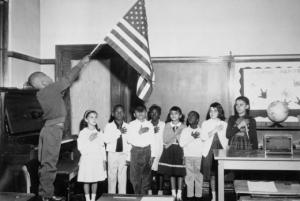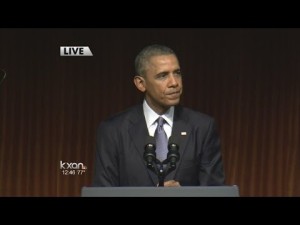(Marty Dobrow is an Associate Professor of Communications at Springfield College.)
April 11, 2014, The Driskill, Austin, Texas
Even President Obama’s staunchest critics—and there are no shortage of them here in Texas—generally concede that the man is a good speaker. So on first blush, it seemed odd to some of us assembled yesterday at the Lyndon Baines Johnson Presidential Library to hear President Obama seemingly repeat himself.
As the keynote speaker on the third and final day of the Civil Rights Summit, an event centered around the 50th anniversary of LBJ’s signing of the Civil Rights Act, the President recounted a famous story about his predecessor. He described Johnson’s immense challenge in taking office in the aftermath of the assassination of President Kennedy on Nov. 22, 1963. For three days there was a grim and surreal vigil across the land, filled with imagery that still touches the heart:
- LBJ’s somber swearing in aboard Air Force One, with Jackie Kennedy (still in her blood-stained pink dress) standing beside him.
- The shooting death of Lee Harvey Oswald by Jack Ruby captured live on television.
- The poignant salute of his slain father by little John F. Kennedy Jr. on his third birthday.
Amid this darkness, LBJ planned what had to have been one of the most difficul t, most freighted, speeches in the history of our country. His first address to Congress and the American people was set to take place on Wednesday, Nov. 27, one day before Thanksgiving. As President Obama related yesterday, Johnson was counseled by many of his top advisors not to broach the controversial Civil Rights Act (that Kennedy had proposed back on June 11—a bill that was stalled in a log-jammed Congress). In Obama’s words:
t, most freighted, speeches in the history of our country. His first address to Congress and the American people was set to take place on Wednesday, Nov. 27, one day before Thanksgiving. As President Obama related yesterday, Johnson was counseled by many of his top advisors not to broach the controversial Civil Rights Act (that Kennedy had proposed back on June 11—a bill that was stalled in a log-jammed Congress). In Obama’s words:
“One particularly bold aide said he did not believe a President should spend his time and power on lost causes, however worthy they might be.
“To which, it is said, President Johnson replied, ‘Well, what the hell’s the Presidency for?’”
The room, filled with a veritable who’s who of civil rights icons (Andrew Young, Bernice King, Julian Bond, etc.) broke into raucous applause.
And then, we heard this:
“What the hell’s the Presidency for?”
This was no redundancy, though. In the second instance, President Obama wasn’t quoting President Johnson. He was standing there almost in the middle of the second term of his own presidency, an historic presidency that began with astonishing hope, and posing the question to himself.
And then answering it: “If not to fight for causes you believe in.”
The Civil Rights Act was, I believe—and I’m certainly nowhere near the first person to say this—the single most important law of the 20th Century. It came at colossal political loss to President Johnson (a near complete swing of the South to the Republicans), but I believe it moved us closer to the idealistic promises in our founding documents about equality and justice. In essence, President Obama stood before us, before the entire nation, yesterday as the very embodiment of the law.
No President has ever paid such homage to LBJ. To do so in the past was viewed as being politically perilous. For Republicans, Johnson was too connected to all the progressive agenda of the “Great Society,” which some of them view as government overreach. To Democrats, Johnson’s plunge into the morass of Vietnam was equally toxic. So Johnson was, in essence, a man on an island.
All of which said to me that LBJ was a profoundly complicated man. We don’t like complication in America, much preferring the soothing illusion of black and white (metaphorically, non-racially). What is more comforting, say, than the unambiguous outcome of an athletic contest, where we have a winner and a loser?
But Obama plunged into the shades of gray in honoring his predecessor and the exact time when “he meets his moment.”
It felt to me that in posing that question a second time, President Obama was doing more than honoring LBJ. He was giving a pep talk to himself.
What is it for? To fight for causes you believe in.
**
Of course, it gets political. Almost everything does these days. As a child, I used to put my hand over my heart every day in school, finishing the Pledge of Allegiance with the idealism of “with liberty and justice for all.” Nowadays, I can’t help thinking about the word that precedes it: “indivisible.”
Even President Obama admitted yesterday, “Our society is still racked with division.”
Still, he summoned a sense of energy and hope: “Ours in the end is a story of optimism.”
And if there is one thing that, in my view, pulls us all together as Americans it is this exact arena of civil rights: our rights as individuals in this country. It seemed symbolically powerful to me that on this final day of the Civil Rights Summit, there were impassioned speeches about civil rights by both President Obama and former President George W. Bush. (Regrettably, Missy and I couldn’t get tickets to the latter speech.)
In some ways, that essential spirit of working together in the name of the rights of citizens was, in my view, best defined by the first panel discussion that kicked off the Civil Rights Summit on Tuesday afternoon. The topic was gay marriage. The two panelists were Ted Olson, the former U.S. Solicitor General, a staunch conservative; and prominent attorney David Boies, a bona fide liberal. Olson and Boies were once front and center on the national stage when Olson represented George W. Bush, and Boies represented Al Gore in the epic Supreme Court case that ultimately decided the 2000 presidential election. What moment in American history can match that one for pitting the two parties against each other with everything on the line?
Here, in the arena of gay marriage, the former adversaries have joined forces in emphatic support. It is not a position, of course, with universal acceptance. There are smart people who disagree. But the winds of change are inexorable. Boies asked, “Are you going to deprive a class of citizens the right to this fundamental relationship?” Olson described gay marriage simply as “an American constitutional issue.”
As much as the presence of four separate U.S. Presidents at this summit, the partnership of Olson and Boies—given the image of Bush v. Gore—was to me one of the most striking moments of the entire week.
**
Missy and I head home later today at the end of this unforgettable experience. I will close with two quick personal anecdotes.
Yesterday, at long last, my quest to have a conversation with Andrew Young for my book was rewarded with an unforgettable experience. After President Obama’s speech, Ambassador Young invited me to travel with him back to this hotel in a shuttle. We went briefly back to his room to get his suitcase, then took an elevator down to the lobby with Mavis Staples and her sister Yvonne (an exchange that was the comic highlight of the week for me). Then we got back in the van and rode to the airport. Ambassador Young was remarkably gracious and generous throughout.
And last night when it was all said and done, Missy and I had a fabulous time at the home of Mark and Amy Updegrove. Mark is the Director of the LBJ Presidential Library and the man who made this whole thing happen. We first met when we were 17 in the backcountry of Yosemite National Park working for the Student Conservation Association. We hit it off famously as we reveled in the great adventure of our young lives.
This past week was another big one. It was a strange sight for me to look at the stage yesterday when President Obama was speaking with three individuals poised beside him in plush red chairs.
In one sat Michelle Obama.
In another sat Congressman John Lewis, the last surviving speaker from the March on Washington.
In the third sat a guy with whom, one summer afternoon many moons ago, I dodged huge hailstones after hours of hauling granite in one of the most beautiful places this amazing country has to offer. His stories last night about the behind-the-scenes drama at the CRS will have me laughing much of the way home.

Excellent recounting. Thanks!